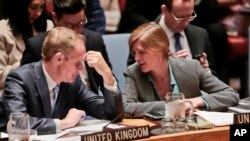The U.N. Security Council has requested that its counterterrorism committee present a proposal for an international framework to combat how terrorists attract and recruit people to commit violent acts.
The committee was asked to make the recommendations by next April 30.
This request is part of intensified efforts by the 15-nation council to fight the growing threat from terrorist groups, including the self-styled Islamic State, Boko Haram and al-Qaida.
At their meeting Wednesday, council members focused on how terrorists exploit the Internet and social media to disseminate their propaganda and recruit new followers, especially young people.
The Internet “has been hijacked to spread the hateful messages of Da’esh in ways previously thought impossible, to reach audiences previously thought inaccessible,” British Ambassador Matthew Rycroft said, using Islamic State’s Arabic acronym.
But he and others pointed out that the Internet and social media platforms such as Facebook and Twitter also can be important tools to counter extremist voices.
“The Internet itself is not a threat,” said U.S. Ambassador Samantha Power. “Though it can host ISIL lies and propaganda, it also makes possible the flow of counter narratives, the exchange of new ideas and the voices of tolerance, who vastly outnumber the exceptions.”
China’s envoy, Liu Jieyi, appeared to call for tighter Internet regulations, saying “we must cut off the channels for spreading terrorist ideologies.”
He cited the Internet and social media as two of those platforms. He urged the international community to take measures – including stepped-up Internet surveillance – to prevent terrorists from releasing audio and video materials online for recruiting, financing, planning or carrying out other terrorist activities.
Safeguarding press freedom
“The protection of free media can be a defense against terrorist narratives,” U.N. Deputy Secretary-General Jan Eliasson told the council. “There must be no arbitrary or excessive punishment against people who are simply expressing their opinions.”
He also urged space for civil society and nongovernmental organizations to operate freely.
Wednesday’s debate was chaired by Egypt, which holds the council presidency this month. Cairo has come under increasing international criticism for its crackdown on NGOs and media organizations.
Foreign Minister Sameh Shoukry dismissed reporters’ questions regarding the arrest of journalists and the difficulties they face working in Egypt, saying there are “a multitude of press outlets, both independent, and even government owned, that are totally free to express their views and do so.”

